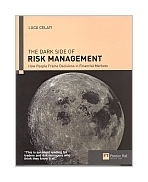|
||
• wydawnictwa polskie
• Zamów informacje o nowościach z wybranego tematu • kontakt
• Cookies na stronie |
DARK SIDE OF RISK MANAGEMENTCELATI L.wydawnictwo: FT/PH , rok wydania 2004, wydanie Icena netto: In practice, people are not nearly as rational as it is assumed and they make more mistakes than their egos are willing to honestly admit. Over-optimism, stubbornness, inertia.... human behaviour is increasingly recognised as a factor in decisions with risk outcomes. The management of risk can no longer ignore behaviour on the grounds that if you can't measure it you can't manage it. Measuring and managing the elusive human factor - the dark side - of risk is the challenge that Luca Celati takes on in this groundbreaking book. Rather than concentrating entirely on the theory, empirical studies and academic debates, this book makes the topic more accessible for people who want to roll up their sleeves and get their hands dirty. This book will provide practical guidelines and thought processes to use inside a financial institution, typically a Bank with a trading room, dealmakers and risk managers, the latter looking at market risk, credit risk or both. What happens inside the decision-makers' heads - rather than the sophistication of the tools they use - is the prime concern here. Luca Celati is the Founder and CIO at Abraxas Capital Management. Prior to founding Abraxas, he held a range of trading and risk roles. Luca has an MBA from Northwestern JL Kellogg Graduate School of Management. Contents PART I: Theory 1 Throwing in the gauntlet 1.1 The punchline:
what's in it for you? 2 Your information risk processing 2.1 About the Questionnaire
- a disclaimer 3 Frames of risk: the concept 3.1 Frames of risk in
decisions: one concept, multiple applications 4 Behavioral finance and basic biases 4.1 Academic anathemas 5 Individual biases and risk consequences 5.1 The broad picture 6 We are not alone: group think, herding and game theory 6.1 Another challenge to
conventional economics and finance PART II: Practice 7 Risk framing and communication 7.1 The information fallacy 8 Riding the tiger: the trader 8.1 Psychology in the
trading room: a diamond buried in the sand 9 Risk management, financial alchemy and illusion of control 9.1 Risk management: one
word, many meanings 10 Frames in action: financial risk disasters and panics 10.1 New accidents, old
mis-management 11 Other Masterpieces outside finance 11.1 Human issues in new
technology management PART III: Going forward 12 So, what now? 12.1 More on your beliefs
and where they can lead you 13 The voice of wisdom: or is it? 13.1 Word to the Opposition 14 Epilogue 14.1 Wrap-up Appendix A: Psychometric
questionnaire Glossary 373 pages Księgarnia nie działa. Nie odpowiadamy na pytania i nie realizujemy zamówien. Do odwolania !. |


